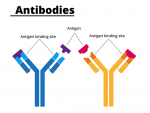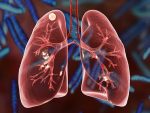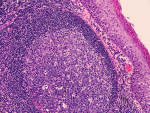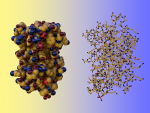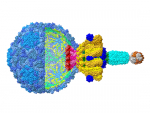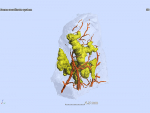Displaying items by tag: department of microbiology
Indirect benefits could include how to lessen rejection of transplanted organs and damage to the transplanted tissue.
Tagged under
Cooper recently won the Albert Lasker Award, known as “America’s Nobel Prize,” given to the living person considered to have made the greatest contribution to medical science.
Tagged under
Lund is the fifth Distinguished Fellow from UAB named since 2019, a sign of the strength of immunology research at UAB.
The site-directed addition of a polymer on the antibody trastuzumab helped this cancer-fighting antibody cross the blood-brain barrier.
Tagged under
Vaccination of neonatal mice with group A Streptococcus promotes clonal expansion of B cells that produce antibody against GlcNAc. The association of reduced Type 1 diabetes risk after group A Streptococcus infection is dependent on these GlcNAc-specific B cells.
Tuberculosis, the world’s leading infectious disease killer, caused 1.6 million deaths in 2021, along with 10 million new cases of tuberculosis every year.
Tagged under
The Blazer Bridge Fund is intended to identify and assist in the development of promising ideas, discoveries, innovations and/or technologies from UAB faculty and staff that have commercial potential.
Tagged under
- release
- harbert institute for innovation and entrepreneurship
- school of education
- school of engineering
- school of medicine
- department of otolaryngology
- department of anesthesiology and perioperative medicine
- department of microbiology
- department of medicine
- division of hematology and oncology
- division of pulmonary allergy and critical care medicine
- division of gerontology geriatrics and palliative care
Lung-resident memory B cells produced during influenza are long-living immune cells that migrate to the lungs from draining lymph nodes and lie in wait as early responders that can quickly react to future infections. They are key sentinels against subsequent viral variants.
Tagged under
This is the first direct evidence that resident microbiota can have a significant impact on the establishment and pathology of infection by two different human-specific pathogens.
Tagged under
Some PD-1+CXCR5+CD4+ T cells will become germinal center-Tfh cells that are essential for B cells to become high-affinity antibody-producing cells. Others do not take that path, instead becoming memory T cells.
Tagged under
Periodontal disease is one of the leading causes of tooth loss in adults and may be a risk factor in the development of Alzheimer’s disease.
Tagged under
Knowledge of this previously unrecognized mechanism may aid therapy for patients with interleukin-6 signaling mutations and hyper-IgE Syndrome, or HIES.
Tagged under
Researchers identify a new target to fight infections caused by the opportunistic lung pathogen Streptococcus pneumoniae — interference with the bacteria’s fermentation metabolism.
Tagged under
These effector memory B cells appear poised for a rapid serum antibody response upon secondary challenge one year later, and evidence shows that the cells in this subset differ from all previously described memory B cell subsets.
Tagged under
- center for clinical and translational science
- release
- school of medicine
- department of microbiology
- department of medicine
- division of infectious diseases
- division of clinical immunology and rheumatology
- department of biomedical informatics and data science
- center for clinical and translational science
Having a bacterial infection at the same time as COVID-19 is a greater risk factor for COVID-19 severity and mortality than previously described risk factors such as advanced age, male sex or various comorbidities.
Tagged under
- release
- school of medicine
- department of medicine
- department of microbiology
- department of anesthesiology and perioperative medicine
- department of pediatrics
- division of pulmonary allergy and critical care medicine
- division of neonatology
- division of pediatric critical care medicine
- division of infectious diseases
- hugh kaul personalized medicine institute
- uab medical scientist training program
The clinical trial focused on very young children, who have a more rapid loss of the pancreatic beta cells than do adolescents. The trial was constrained to a low-dose level, but showed safety and tolerability and reduced serum glucagon, a secondary outcome.
Tagged under
Basic research in bacteria has led Michael Niederweis and Moon Nahm to 17 U.S. patents and various new technologies with real impacts on the welfare of society.
Tagged under
ohn Kearney, Ph.D., Distinguished Professor of Microbiology at the University of Alabama at Birmingham, has been named a 2023 Distinguished Fellow of the American Association of Immunologists.
Tagged under
High-resolution knowledge of structure is a key link between viral biology and potential therapeutic use of the virus to quell bacterial infections.
Tagged under
Insights that are not possible with conventional two-dimensional platforms include characterization of obliterated airways in tuberculosis and hemorrhage from ruptured blood vessels in COVID-19 lungs, at near-microscopic levels.
Tagged under



